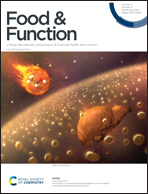6-Paradol and its glucoside improve memory disorder in mice†
Abstract
In this study, the effects of 6-paradol (6P) and 6-paradol-β-glucoside (6PG) on neuritogenesis were investigated using PC12 cells. Treatment with 200 μM 6P or 6PG and nerve growth factor (NGF) (5 ng mL−1) increased the number of elongated dendritic cells 8.7 and 5.4 times, respectively, compared to that with NGF (5 ng mL−1) treatment alone. 6P and 6PG did not stimulate the phosphorylation of extracellular regulated protein kinases (ERK)1/2 and cAMP response element-binding protein (CREB) in the tropomyosin receptor kinase A (TrkA) pathway as their activities were suppressed by the pathway inhibitor, k252a. 6P enhanced Ca2+ influx into the cells, whereas 6PG had no effect on Ca2+ influx, although it stimulated PC12 cell differentiation. High-performance liquid chromatography (HPLC) analysis of 6PG in PC12 culture medium suggested that 6PG was deglycosylated to generate 6P, which exhibited the effect. Furthermore, the bioactivities of 6P and 6PG were investigated in mice, and the results revealed that they ameliorated short-term memory loss in animals during behavioral testing.



 Please wait while we load your content...
Please wait while we load your content...